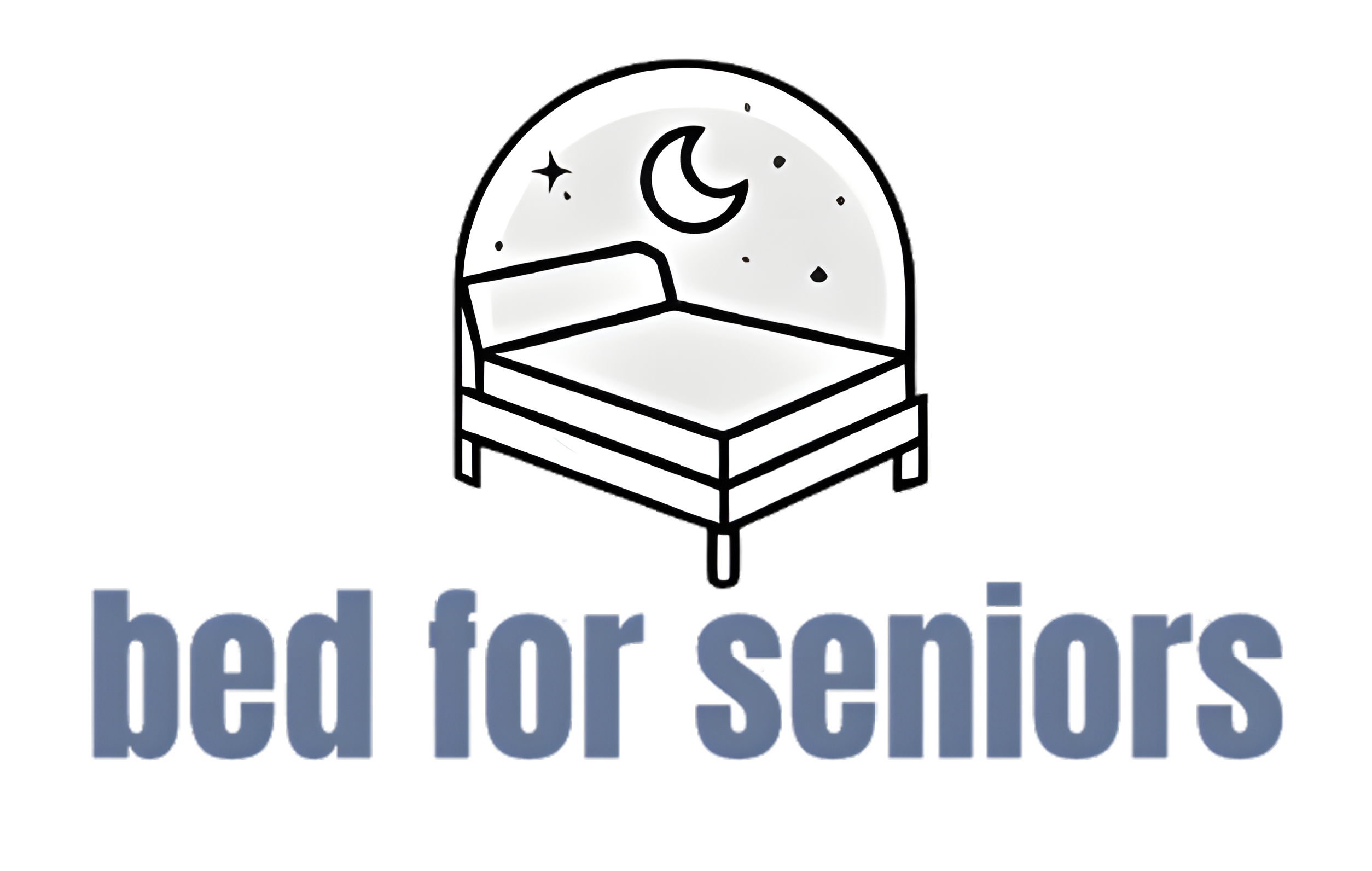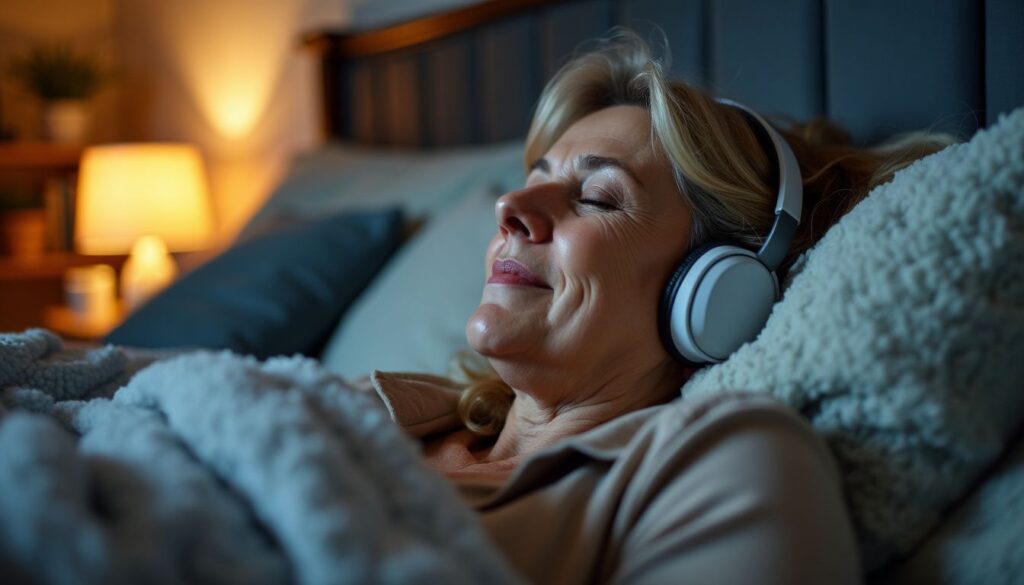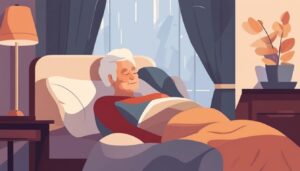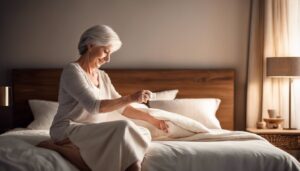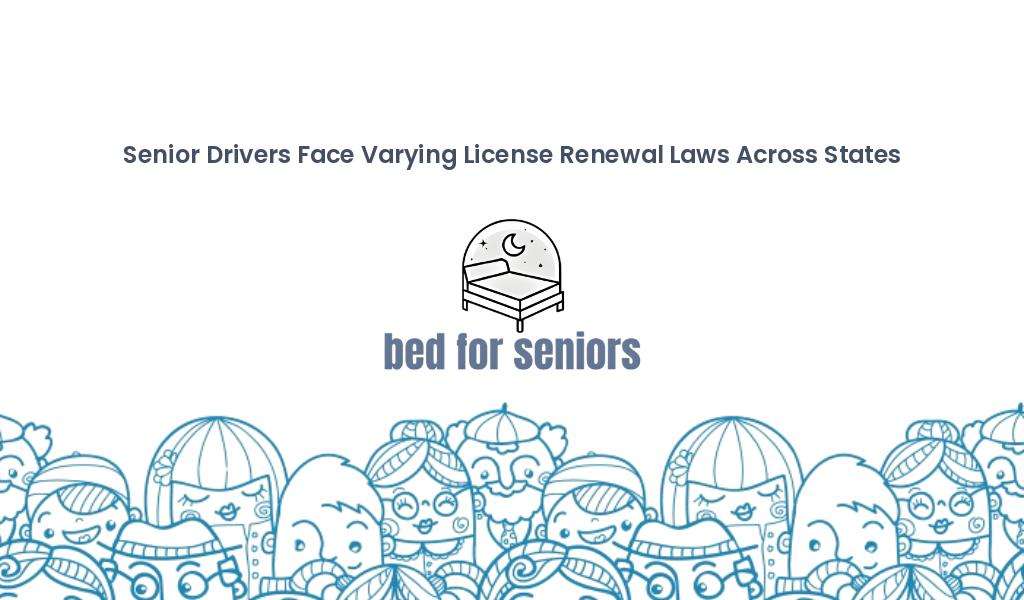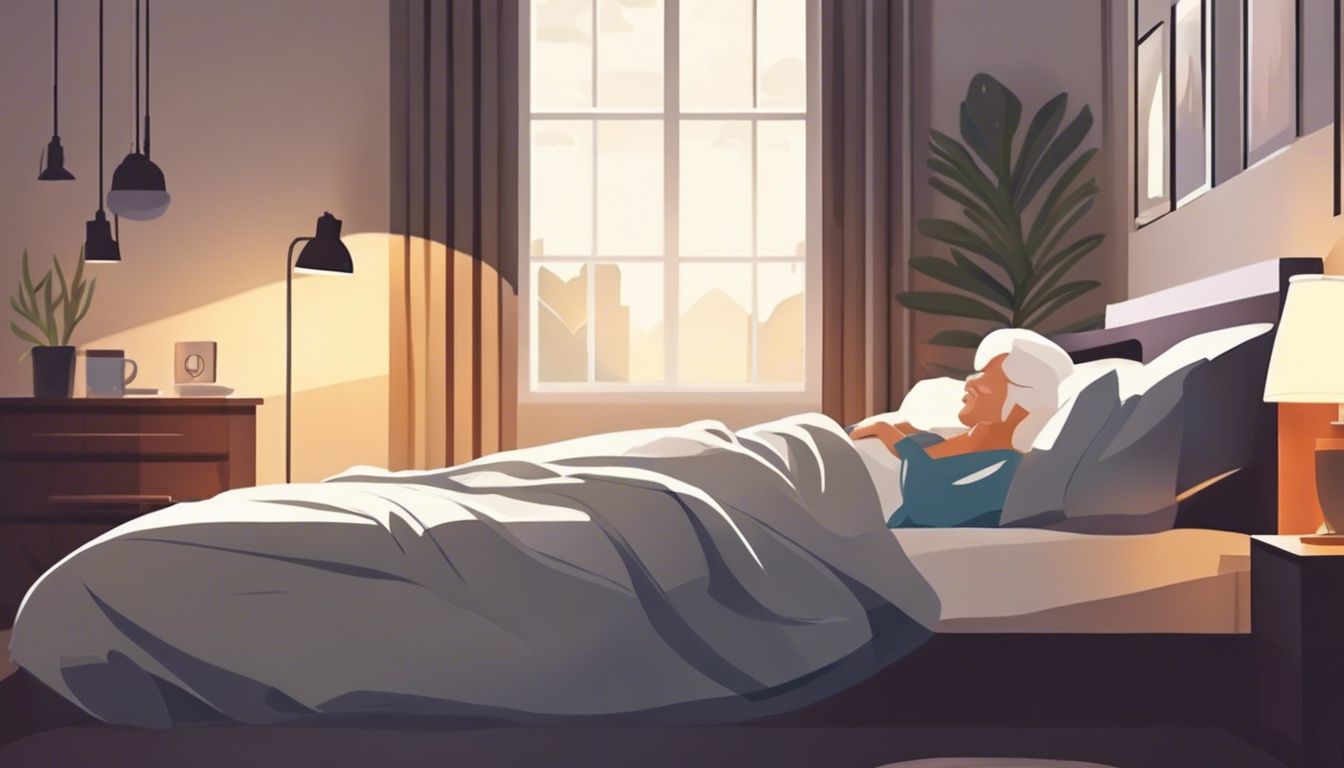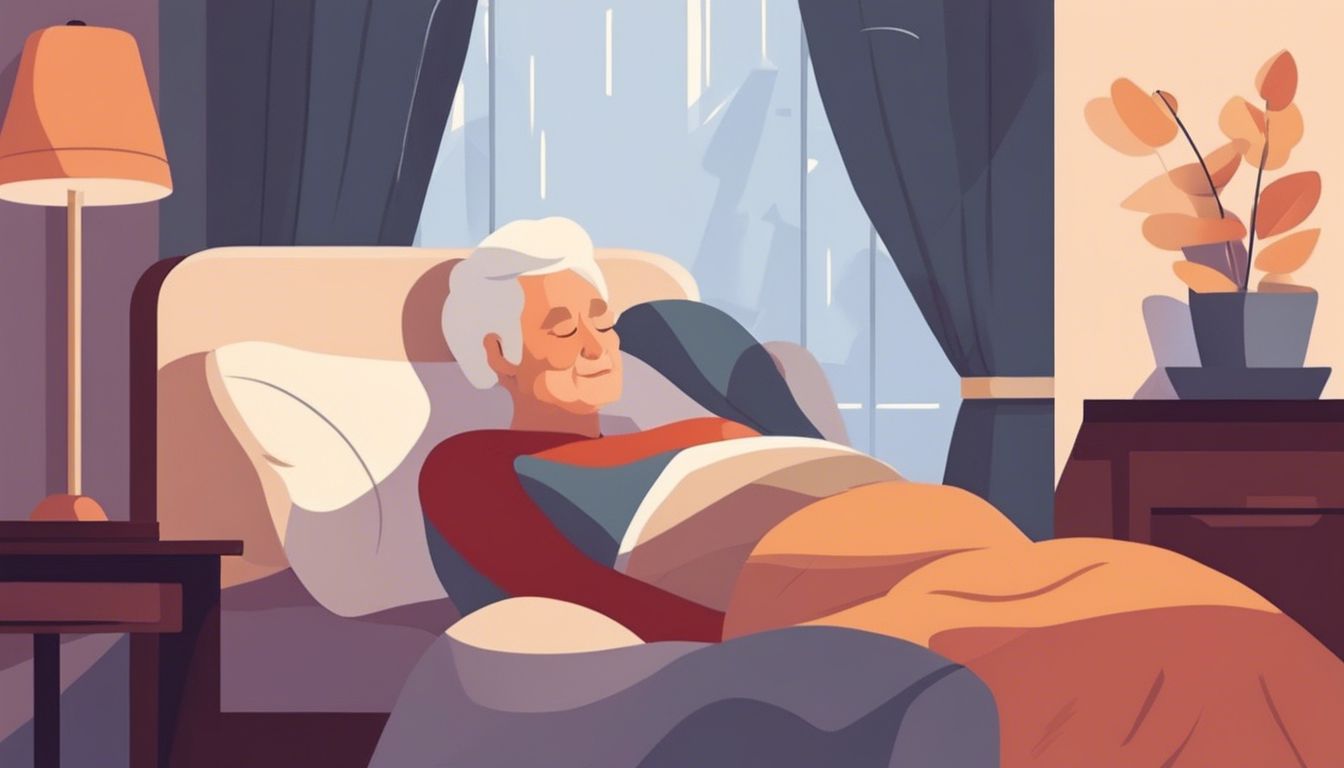Noise interrupts sleep often for caregivers. Reviews show AcousticSheep SleepPhones Wireless helps. This article covers top noise-cancelling options to improve rest. Find the best fit—read on.
Key Takeaways
- Noise-cancelling headphones and earbuds help caregivers sleep by blocking outside noise. Brands like Bose, Sony, and Apple have good options.
- Sleep headphones and white noise machines make night shifts easier for caregivers. Products from AcousticSheep and Anker are popular choices.
- Comfort, price, and how well devices block sound matter when picking the right tool. Caregivers need to think about these before buying.
- Testing shows that not all products work the same in every place. It’s important to try them where you will use them most.
- Caregivers say a quiet room helps them rest better. Devices that fit well and last through the night are best for uninterrupted sleep.
Evaluating Noise-Cancelling Solutions for Caregivers
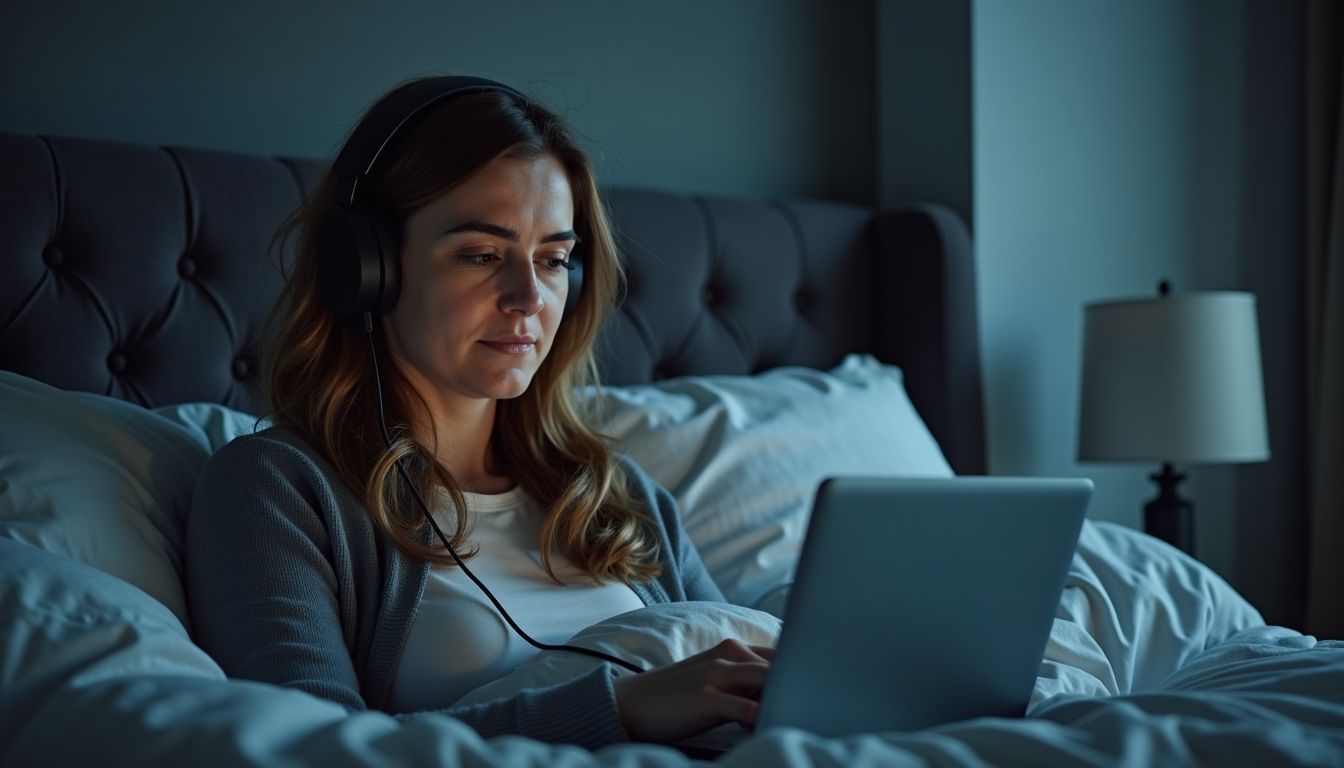
Caregivers need quiet to rest well. We look at gadgets like headphones and machines that block out sound, helping them sleep better.
Importance of Noise Reduction for Caregivers
Noise reduction helps caregivers get better rest. Good sleep keeps them ready for their tasks. Headphones and earbuds with active noise cancellation can block out sounds from the outside world.
These devices come in many types, like over-ear headphones or wireless earbuds. Some even let caregivers hear important noises when needed, thanks to special features.
Noise is everywhere, but silence is a caregiver’s secret tool for wellness.
For night shifts, sleep headphones play soft music or white noise without bothering others. This can be a game-changer for those who need to stay alert yet rested. White noise machines also mask disruptive sounds, making it easier to fall asleep faster and stay asleep longer.
By using these tools, caregivers can maintain their health and provide better care.
Types of Noise-Cancelling Products
Rest for caregivers is key. Noise-cancelling gear can help. Here’s a list of types:
- Headphones like Bose QuietComfort and Sony WH-1000XM5 offer active noise cancellation. They block outside sounds so caregivers can relax or sleep without disturbances.
- Earbuds, including Apple AirPods Pro and Bose QuietComfort Ultra Earbuds, are smaller but still powerful. They fit snugly in the ear, making them more comfortable for sleeping.
- Sleep headphones combine comfort with sound blocking. AcousticSheep SleepPhones wrap around the head and are great for night-shift caregivers who need rest during the day.
- White noise machines mask environmental noises with soothing sounds like rain or ocean waves. Models from Marpac Dohm and LectroFan are popular choices.
- Sound masking systems use special speakers to add a low level of background sound in a room. This makes disturbing noises less noticeable.
- Earplugs are simple yet effective for blocking out unwanted noise while sleeping or resting.
Each option serves to create a better rest space by reducing unwanted noise, making rest and sleep easier for caregivers.
Best Noise-Cancelling Headphones
Finding the right noise-blocking earphones can make all the difference for a caregiver’s rest. We’ve looked at top models from Bose, Sony, and Apple to help you choose.
Bose QuietComfort Ultra Headphones
Bose QuietComfort Ultra Headphones block out noise. They let you focus on rest or tasks without outside sounds bothering you. The headphones connect to smartphones and tablets easily.
This means caregivers can listen to music, take calls, or use apps with no trouble.
They offer long battery life, too. You don’t need to worry about charging them often.
They also have wireless charging for easy power-ups. Plus, the active noise cancellation feature is top-notch. It helps keep environmental noises away better than most other headphones.
– Features & Benefits
Transitioning from the topic of the Bose QuietComfort Ultra Headphones, let’s explore the exceptional attributes that set them apart. These headphones provide superior noise reduction, allowing you to concentrate or unwind without outside noises disrupting you.
They conform comfortably to your ears, making them ideal for extended usage. Given their full-day battery capacity, caregivers can be at ease, not needing to concern themselves with mid-shift charging.
The audio quality is unmatched, transforming your music or podcast listening into an immersive experience. They come with uncomplicated controls, allowing convenient adjustment of volume or skipping tracks without the need to use your phone.
Furthermore, they are compatible with IOS devices and hearing aids that connect via Bluetooth. This ensures caregivers remain linked and entertained with ease.
– Pros & Cons
Caregivers need quiet time, too. Let’s review some noise-cancelling devices. We’ll break them down into pros and cons. This quick comparison helps you decide fast.
| Device | Pros | Cons |
|---|---|---|
| AcousticSheep SleepPhones Wireless | Comfortable. Good bass. Great for sleep. | More expensive than earplugs. |
| Anker Soundcore Sleep A10 | Small and secure. Good for overnight use. | May not block all sounds. |
| 1More’s Sleeping Earbuds Z30 (Upcoming) | Long battery life. Improved noise isolation. | Not yet available. |
| Soundcore’s Sleep A20 (Upcoming) | Features promising for a good night’s sleep. | Release date and price unknown. |
| HoomBand | Better sound quality than budget options. | Uncomfortable for back sleepers. Large Bluetooth module. |
Choosing the right noise-cancelling device matters. Think about comfort, how well they block noise, and the price. Next, let’s talk about how these products get tested.
Sony WH-1000XM5
The Sony WH-1000XM5 headphones block noise well. They have soft ear cups. You can wear them for hours. The sound quality is great too. You will hear music clearly, not the loud outside world.
These headphones connect to your phone easily. You can answer calls without taking them off. They are good for people who need quiet and want to stay connected.
Apple AirPods Max
Apple AirPods Max stand out for their advanced noise cancellation. They use microphones to listen to the world around you and block out unwanted sounds. This feature helps caregivers work in noisy environments or rest well during breaks.
With soft, over-ear cushions, these headphones offer comfort for long periods.
AirPods Max connect easily with iPhones and other Apple devices. Their battery lasts up to 20 hours, even with noise cancelling on. This makes them great for long shifts without worrying about charging too often.
Experience silence in busy surroundings with Apple AirPods Max.
Top Earbuds for Noise Cancellation
Finding the best earbuds for quiet is key for caregivers needing peace. We’ll show you top picks, making sure they fit well and block out noise.
Bose QuietComfort Ultra Earbuds
Bose QuietComfort Ultra Earbuds are great for caregivers. They block unwanted noise so you can rest better. These earbuds have advanced tech to quiet sounds around you. You will sleep well, even if there’s a lot of noise outside.
They last 10 hours on one charge. So, they work all night without stopping. Caregivers find them comfy and easy to wear in bed. Now, let’s look at Sony WF-1000XM5 as another option for peace and quiet.
Sony WF-1000XM5
The Sony WF-1000XM5 earbuds are not in the article. Details about them were left out. This means no info on how they work or what makes them special was shared. There’s nothing said about their noise-canceling features, design, or battery life.
No specific details about the Sony WF-1000XM5 are provided in this review.
Jabra Elite 10 Gen 2
Moving from the Sony WF-1000XM5, let’s talk about the Jabra Elite 10 Gen 2 earbuds. They shine for caregivers needing peace in their bedrooms. These earbuds can turn off sounds by themselves after some time.
This is perfect when you want quiet without pressing buttons.
Jabra Elite 10 Gen 2 stand out for blocking noise in caregiver rooms. They are part of a bigger look at how sound tools help sleep and care needs. With these, you get great silence with just a few taps.
Best Sleep Headphones for Night Shift Caregivers
Night shift caregivers need restful sleep, too. Sleep headphones help block out noise for undisturbed slumber.
AcousticSheep SleepPhones Wireless
AcousticSheep SleepPhones Wireless cost $100. You can buy them from Amazon or directly from SleepPhones. They work for 24 hours on a single charge. Plus, cleaning is easy since you can take out the parts that shouldn’t get wet.
These headphones come in two types of fabric: fluffy fleece for warmth and soft “breeze” fabric for cooler feel. You can pick from three sizes: small, medium, or large.
The Bluetooth module has buttons hidden under the fabric, making it simple to adjust volume or tracks without looking. Every pair comes with a one-year guarantee, giving you peace of mind about your purchase.
Whether you’re caring through the night or need quiet during the day, these headphones help block out noise while staying comfortable enough to sleep in.
– Description & User Experience
SleepPhones Wireless and Soundcore Sleep A10 stand out for caregivers. They fit well on different head sizes and shapes, making them comfy for all-night use. These headphones also let users hear noises that matter, like alarms or calls for help.
For those who move a lot in sleep, these models stay put and keep bringing calm sounds or silence throughout the night. With at least 10 hours of battery life, they won’t quit before morning comes.
Next up, innovative devices take noise cancellation further. Explore how white noise machines and sound masking systems create a peaceful space for caregivers to rest well.
Anker Soundcore Sleep A10
Moving on from SleepPhones, the Anker Soundcore Sleep A10 offers a different choice for caregivers. This product costs $130 at places like Walmart, Amazon, and Best Buy. The earbuds come with a case that gives seven extra charges.
When streaming audio, they work for 6 hours instead of 10. They also have an auto-sleep mode and an alarm built in but no snooze button.
The Anker Soundcore Sleep A10 shows how technology can aid in better rest for those who care for others around the clock.
These earbuds are made to fit well through the night. They use active noise cancellation to block out sounds that might wake you up or keep you from sleeping well. For caregivers needing rest between shifts or those disturbed by environmental noise, these headphones offer peace without breaking the bank or adding hassle to nighttime routines.
Innovative Noise Masking Devices
Innovative noise masking devices can change the game for a quieter sleep… Think white noise creators and sound covering systems; these gadgets might be what you need to find peace.
Check them out to see how they can help you sleep through anything.
White Noise Machines
White noise machines create steady sounds. These sounds block out other noises that can disturb sleep or focus. Many types exist, like fans or nature sounds. Caregivers use these machines to find peace in noisy environments.
This helps them rest better.
Some recommended models include the LectroFan and Marpac Dohm. The LectroFan offers various sound options, such as white noise and fan sounds. The Marpac Dohm creates a soft, fan-like hum using real fan parts inside it.
Both help users fall asleep faster and stay asleep by reducing disruptions from outside noise.
– Recommended Models & Features
Caregivers need quiet to rest well. Noise-cancelling devices can help a lot. Here are some models and their features:
- LectroFan High Fidelity White Noise Machine
- Has 20 different sounds, including fan sounds and white noise.
- You can set a sleep timer for up to 7 hours.
- Marpac Dohm Classic White Noise Sound Machine
- Uses a real fan inside for natural white noise.
- Offers two-speed options for adjustable tone and volume.
- SNOOZ White Noise Sound Machine
- Comes with a remote control app to change settings from your phone.
- Features a fully adjustable volume and tone.
- Adaptive Sound Technologies Sound+Sleep SE
- Offers over 60 sound profiles to match your environment.
- Includes adaptive sound technology that adjusts volume automatically.
- Big Red Rooster 6 Sound White Noise Machine
- Has 6 sound options, including rain, brook, ocean, thunder, white noise, and summer night.
- Portable design makes it easy to move from room to room.
Next, let’s look at sound masking systems for more noise control options.
Sound Masking Systems
Sound masking systems help caregivers in their bedrooms. Systems like EnvoyatHome and Rest Assured keep an eye on daily routines. They find emergencies or changes in wellness. Rest Assured uses live camera feeds to watch the home.
EnvoyatHome has sensors that make soft sounds to cover up noise. These tools are good for caregivers who need quiet to sleep well.
Earbuds and headphones can be too big to wear all night. Instead, SleepPhones by AcousticSheep and Anker Soundcore Sleep A10 are better choices. They fit well, control sound, last long, and feel comfy.
Caregivers can block out noise or hide ringing ears with these sleep headphones, making it easier to get the rest they need while taking care of others.
Considerations When Choosing Noise-Cancelling Devices
Before picking a sound-stopping tool, think hard about where and how you will use it. Price and comfort matter just as much as how well it blocks out noise.
Compatibility with Sleeping Environment
Choosing noise-cancelling gear that fits well with where you sleep is key. Some devices work better in quiet rooms, while others are best for louder spaces. For example, active-noise-cancelling headphones reduce background sounds like traffic or a ticking clock.
But if you need to hear alarms or calls, look for options that let important noises through.
Think about how light or heavy sleepers can use these tools differently. Light sleepers might want earbuds that block out all noise. Heavy sleepers may prefer headbands that play soft music but still allow some sound in.
This ensures they don’t miss important alerts—like smoke detectors beeping or an alarm clock ringing—in the night.
Comfort and Wearability
Good fit matters a lot for caregivers. They need devices they can wear for hours without hurt. Headphones and earbuds with soft pads or tips are best. They should not press too hard on ears or head.
Look for models with adjustable parts to fit different sizes.
Caregivers move around a lot at night. So, wireless headphones are a smart choice. This way, no cords get in the way while checking on others or resting. Sleep headphones are also great for those who lie down but stay alert.
They blend comfort with clear sound, helping caregivers relax and stay informed at the same time.
Price vs. Performance
Caregivers need good sleep. They look at prices of noise-canceling devices like headphones. AcousticSheep SleepPhones cost $100. Anker Soundcore Sleep A10 are $130. Caregivers want to know if they work well for the price.
They ask, “Do these help me sleep better?” Yes, they do. Both block out noise from outside and inside the house. This helps caregivers rest well after long days or nights with those they care for.
The choice depends on their budget and needs for quiet sleep time.
How We Test Noise-Cancelling Products
We put every noise-stopping gadget through tough tests. We listen in loud places and see how well each one keeps the noise out.
Testing Criteria and Methodology
Our team picks noise-cancellation devices that are easy to clean and last at least 10 hours on a single charge. They must not have lights or sounds that could disturb sleep. To find the best, we look at battery life, comfort, how well they block outside noise, and if they fit in a caregiver’s sleeping area without trouble.
We check each device in places with lots of sound to see how good they really are at keeping things quiet.
For every pair of headphones or earbuds we try out, our link is clear: They need to work well for long-term care situations where caregivers need rest. We use these criteria because we know peace and quiet are key for caregivers to stay sharp and helpful.
Our tests make sure caregivers can rely on these products night after night.
Importance of Real-World Testing
Real-world testing makes sure noise-cancelling devices work well in daily life. We test products where caregivers use them, like bedrooms or living rooms. This shows us how good they are at blocking sounds from TVs, talking, or outside noise.
We also check if these tools help staff with tinnitus sleep better. Tests include wearing different ANC headphones and earbuds overnight to find the best ones for a quiet rest. Using feedback, we pick top gadgets that really ease night shifts for caregivers.
Organizing a Caregiver’s Bedroom for Optimal Rest
Caregivers need quiet rooms. A calm space helps them sleep well. Place a white noise machine near the bed to block outside sounds. This will make it easier for caregivers to rest deeply.
Make sure the room is dark at night. Use thick curtains to keep out street lights and sunrise.
Keep the bedroom clean and simple. Too many things can make it feel crowded and stressful. Choose a comfortable mattress and pillows for good sleep. Add plants for cleaner air and a peaceful feeling.
Caregivers work hard, so their bedroom should be a place where they can truly relax and recharge.
User Reviews and Feedback
Check out what other caregivers said about these devices and find the perfect fit for you.
Insights from Caregivers
Caregivers say comfort and a secure fit are key in sleep headphones. They need these for better rest. Good headphones must last at least 10 hours on one charge. This is vital for overnight use.
No device fits every need perfectly, so choices depend on specific requirements caregivers have.
Bluetooth reliability and audio quality matter too when streaming sounds or music during the night. Caregivers share that these features help them relax and fall asleep faster, making caregiving less stressful the next day.
Let’s move on to common praises and complaints.
Common Praises and Complaints
| Product | Praises | Complaints |
|---|---|---|
| AcousticSheep SleepPhones Wireless | Great for tinnitus masking, comfy for sleeping. | Limited in blocking out all noise. |
| Anker Soundcore Sleep A10 | Good at noise isolation, can play music via Bluetooth. | Using Bluetooth can drain the battery fast. |
Moving to the next heading…
Conclusion
Choosing the right noise-cancelling tools is key for caregivers. We looked at different types, from headphones to earbuds and white noise machines. Each has its own perks. Headphones like the Bose QuietComfort offer top sound stopping power.
Earbuds provide ease and comfort, while sleep aids help through long nights. For every need, there’s a fit—whether it’s blocking out sound or finding peace in quiet moments. With these options, caregivers can find better rest and focus on what matters most: caring for others with patience and love.
For more ideas on creating a peaceful and restful space, check out our guide on organizing a caregiver’s bedroom for optimal rest.
FAQs
1. What are some noise-cancelling options for a caregiver’s bedroom?
Options include active noise cancellation devices like pairs of headphones or earmuffs, and soundproofing the room to lessen environmental noise impact.
2. Can I use my Flexible Spending Account (FSA) or Health Savings Account (HSA) to buy these devices?
While each FSA and HSA has different rules, many allow for the purchase of health-related items such as activity trackers or pulse oximeters. It’s best to check with your plan provider.
3. Are there any reviews on specific noise-cancelling products?
Yes! Websites like pcmag.com and Tom’s Guide offer in-depth reviews on various products including second-generation AirPods Pro and true wireless earbuds with LDAC codec support.
4. How can using a noise-cancellation device help caregivers, especially those caring for older adults?
Reducing background noises can help caregivers focus better on their tasks reducing feelings of anxiety, which is particularly beneficial when caring for geriatric patients who may require intensive care.
5. Is privacy an issue when using smart devices like Alexa in a caregiver’s bedroom?
Privacy risks exist with any smart device that uses mics or video calling features; however, most have settings allowing you to control what information is shared.
6. Do these devices also work well for telehealth services?
Absolutely! Noise-cancelling headphones can make video calls clearer by reducing background sounds during consultations – helpful whether you’re logged into Medicare Parts A & C telehealth services or participating in a clinical trial via webcam.
